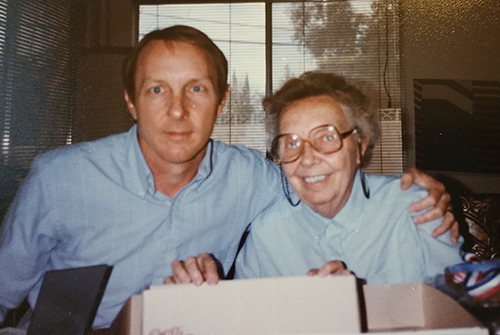 Capt. John Moore '66 with his mother Helen Fay Smith Moore.
Capt. John Moore '66 with his mother Helen Fay Smith Moore.
Growing up in Center, Texas, in the 1940s and 50s as the second of seven children, Capt. John Moore ’66 remembers his mother’s influence fondly. “She was a gentle, kind, smart and loving person—just about the perfect mother,” said Moore. “I feel I owe everything to her.”
Helen Fay Smith Moore grew up mostly in Southern Illinois and Southeastern Missouri during the Great Depression. After graduating from high school in Dexter, Missouri, she taught one year in a one-room elementary school before marrying Moore’s father, a traveling salesman. She had a lifelong love of music and taught herself to play the piano by practicing on a wooden board with the keys drawn in pencil. After raising a large family, she returned to work teaching piano to elementary and middle school children.
“I can still remember some of her favorite sayings: ‘The biggest raindrops stop falling the quickest,’ ‘straighten up and fly right,’ ‘only the strong can afford to be gentle,’ ‘this too shall pass,’ and ‘it’ll never be noticed on the back of a galloping horse,” said Moore. “I think these sentiments reflect how she felt about dealing with other people. The principles she lived by were fairness, gentleness, generosity, compassion, hard work and religious devotion. She was a woman of high integrity with a strong moral compass, and very wise.”
To celebrate his mother’s legacy, Moore created a scholarship in her name using an IRA charitable rollover gift. He hopes that his gift will encourage students to pursue an education, much like his mother encouraged him.
Texas A&M and Beyond
When Moore applied to college after his own high school graduation, finances played a major role. Ultimately, he attended Texas A&M because of the financial assistance he was offered. “The university gave me a chance, sight unseen, by giving me an Opportunity Award Scholarship, which paid me $300 per year for four years,” he said. While at Texas A&M, Moore was very involved in several engineering societies and honor organizations. In 1966, he graduated with an electrical engineering degree—a feat that made Helen Fay very proud.
“She had always seen the value of higher education and she encouraged me to go to college, perhaps partly because she was denied that opportunity by financial constraints during the Depression,” said Moore. “She was a constant supporter of my academic achievements.”
Moore’s biggest takeaway from his time at Texas A&M was that dedication and hard effort pays off, and that the university, as an institution and an asset for the state, was a wonderful vehicle for bettering oneself. He continued his education at Oklahoma State University, receiving a master’s degree in electrical engineering and then embarking on a challenging, 30-year career in federal service.
He started at NASA, working on the Apollo Program’s mission of landing humans on the moon. After a few years, he took a commission in the U.S. Public Health Service, where he worked in radiation monitoring support of the nation’s nuclear weapons development program at the Nevada Test Site; in the Superfund Cleanup Program; and in advanced monitoring systems development. He was later detailed to the U.S. Environmental Protection Agency’s national environmental research laboratory, where he eventually held its top executive position as director.
Now retired, Moore said he began to realize how important his time spent in College Station was and wanted to give back. He contacted his IRA plan administrator about donating to the Texas A&M Foundation. “I had an IRA with capital appreciation,” he said, “and by donating it, I avoided taxes and reduced my taxable income. Since I wanted to create an endowed scholarship, this seemed a good way to go.” Moore’s gift totaled more than $68,000, and his scholarship will give priority to students from Stoddard County, Missouri (where his mother attended high school) and Shelby County, Texas (where he attended high school).
He hopes to help a student who might not be able to afford college, like his mother. “I hope it might make the difference in helping some deserving boy or girl decide to go to college, if they had a little financial help,” said Moore. “The beauty of an award to someone from Stoddard County is that they would be entitled to in-state tuition since they earned a competitive scholarship. That would multiply the amount of my scholarship by a factor of six.”
Moore recommends the use of an IRA charitable rollover gift for others who wish to donate. If you are 70½ or older, an IRA charitable rollover gift can help lower the income and taxes from your IRA withdrawals. IRA charitable rollover gifts create an avenue for you to reduce taxable income; avoid taxes on transfers of up to $100,000 from your IRA to the organization of your choice; satisfy your required minimum distribution for the year; and create a gift that is not subject to the deduction limits placed on other charitable gifts. Individuals can specify that their gift support any area of Texas A&M, whether that be students, faculty, colleges, programs or student organizations.
“If my mother knew about this gift, I think she would be brought to tears,” Moore said, adding that she never drew attention to herself. “She’d probably be a little bit embarrassed, but she’s truly deserving of the recognition. I think she would be very proud.”